Men don’t feel emotional pain. Or so we have been taught. The reality is men can get depressed, anxious, and suicidal. Mental illness in men is an alarming issue and we need to pay more attention to the signs of mental health issues in men during this men’s mental health month.
Mental illness in men
Men’s mental health issues are a public health concern that affects millions of men across the globe, yet it is a silent epidemic that is desperately begging for attention. Adult men, especially men in their 50s, suffer from a range of mental disorders but they choose to stay silent. As men, our self-esteem and sense of self-worth is closely tied to what society considers to be a success –
- Career accomplishments
- Financial security
- Social reputation
- Ability to provide for the family
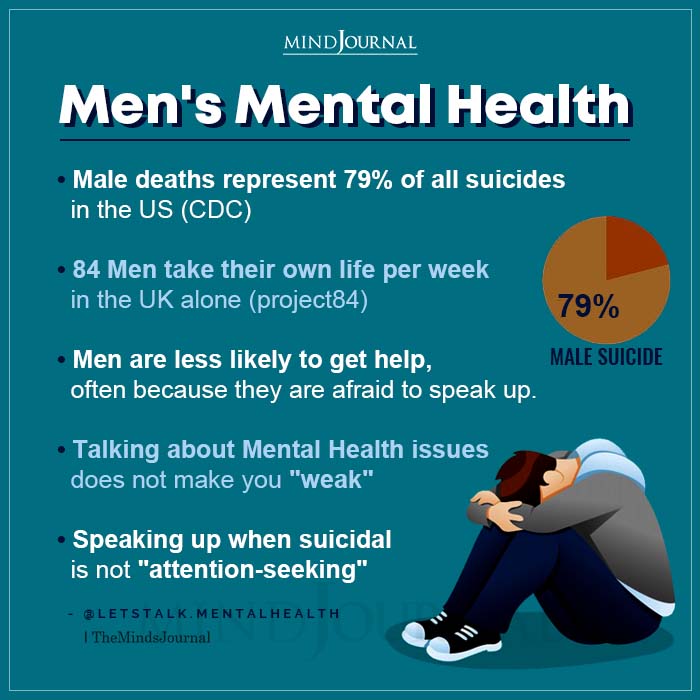
But no one talks about the sacrifices men make to pursue these goals, how competitive it can be for them, and the toll it takes on their mental health. When ordinary, hard-working, decent men fail to achieve the impossibly high standards of masculinity and success established by our society, they are shamed and looked down upon. This failure can lead to signs of mental health issues in men.
Related: 3 Most Common Mental Health Disorders In Men
One 2022 study explains “Too often many men do not talk about feeling down, sad, or depressed, and might not mention emotional or behavioural difficulties at all.” However, even when they do express their problems, it is not focused on their emotions, rather on “functional problems”, like performance at work. This is why we need to pay more attention to recognizing men’s mental health symptoms and encourage them to seek medical help.
Warning signs of mental health issues in men
Although both men and women can suffer from the same psychiatric disorders, signs of mental health issues in a man can vary greatly from that of a woman. The 5 major warning signs of mental health issues in men are –
1. Dramatic changes in mood
A man suffering from some form of mental illness is likely to experience extremely high and/or low moods accompanied by high and/or low levels of energy. Such extreme changes in mood is common for most mental conditions.
2. High levels of anxiety
When a man is coping with mental illness, they will probably experience excessive anxiety, worry and fear. Coupled with overthinking and intrusive thoughts, paranoia is also widely experienced by men suffering from mental disorders.
Related: 11 Things People With Anxiety Want You To Know
3. Persistent sadness
One of the most common signs of mental health issues in men is long-lasting feelings of sadness. Often associated with depression and related conditions, feelings of hopelessness, helplessness, emptiness, and irritability can be frequently experienced.
4. Changes in appetite and/or sleep
Men coping with mental illness often experienced dramatic changes in their appetite, either eating less or more than they previously used to. They may also experience drastic changes in their sleeping patterns or have trouble sleeping as well.
5. Social withdrawal
Social isolation and withdrawal are among the most widely observed signs of mental health issues in men. They may avoid socializing or interacting with others, become increasingly shy and withdrawn and may even isolate themselves, avoiding contact even with loved ones.
Other signs of mental health issues in men
Apart from these, there are several signs of mental health issues in a man that you may need to look out for. Some of them are mentioned below –
- High levels of stress
- Aggressiveness or uncontrollable anger
- Trouble concentrating or being easily distracted
- Intrusive or obsessive thoughts
- Lack of interest in life
- Inability to experience positive emotions
- Fatigue or exhaustion
- Physical symptoms like body aches, headaches, digestive issues, etc for no apparent causes
- Feelings of guilt, inadequacy or worthlessness
- Compulsive or obsessive behaviors
- Delusions and/or hallucinations
- Feeling restless or on edge
- Talking too much or too fast
- Risky or reckless behavior like gambling, spending spree, or unsafe sex
- Drugs or alcohol abuse
- Self-harm or suicidal ideation
Related: Men Tell Us What They Wish Other Men Knew About Mental Health
Unrecognized signs of mental health issues in men
Apart from the signs of mental health issues in a man mentioned above, there may be some other symptoms of psychological problems in men that may not be officially recognized by mental health professionals. These may include –
- Escapist behavior, like spending too much time with friends or playing video games or sports
- Being abusive or controlling in relationships
- Being easily annoyed, rude, or expressing misplaced anger
- Drinking more than usual or experimenting with drugs
- Avoiding work, family duties, and/or other responsibilities
- Making grandiose plans
- Inability to function normally
- Nervousness
- Unusual or uncharacteristic behavior
- Illogical thinking
- Low sex drive
- Refusing to seek help
Signs of mental health issues for men in their 50’s
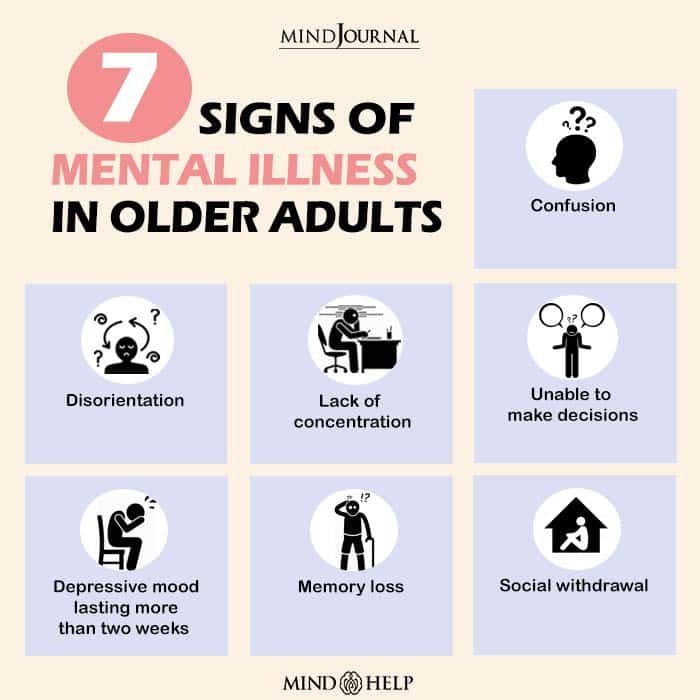
Although male mental health issues can affect men of any age, men in their 50s are specifically at risk of developing psychiatric conditions. According to the Centers for Disease Control and Prevention (CDC), about 20% of individuals aged 55 years or older tend to experience some form of mental illness, like severe cognitive impairment, bipolar disorder, mood disorders, and anxiety. In fact, “Older men have the highest suicide rate of any age group,” states the CDC report.
Several factors can contribute to the development of mental health conditions in older men, such as changes in their brain structure, reduced attention, poor memory, and lower testosterone. Moreover, hormonal and mental changes for men at 50 can lead to a number of mental health issues.
Related: Aging And Mental Health
Some common signs of mental health issues for men in their 50’s, apart from the symptoms already discussed above, include –
- Increased stress
- Anxiety
- Depression
- Low mood
- Low energy
- Reduced self-confidence
- Lowered motivation
- Appetite changes
- Insomnia or sleeping difficulties
- Trouble concentrating
- Erectile dysfunction
- Physical weakness
- Suicidal thoughts
Men and mental health: A silent crisis
Men’s mental health issues are topics we prefer to avoid. We don’t want to see our men weak, feeble, vulnerable, and in pain. Social stereotypes dictate that men should be strong and stoic, not depressed and suicidal. Yet the reality is very different from what our society wants to see or believe.
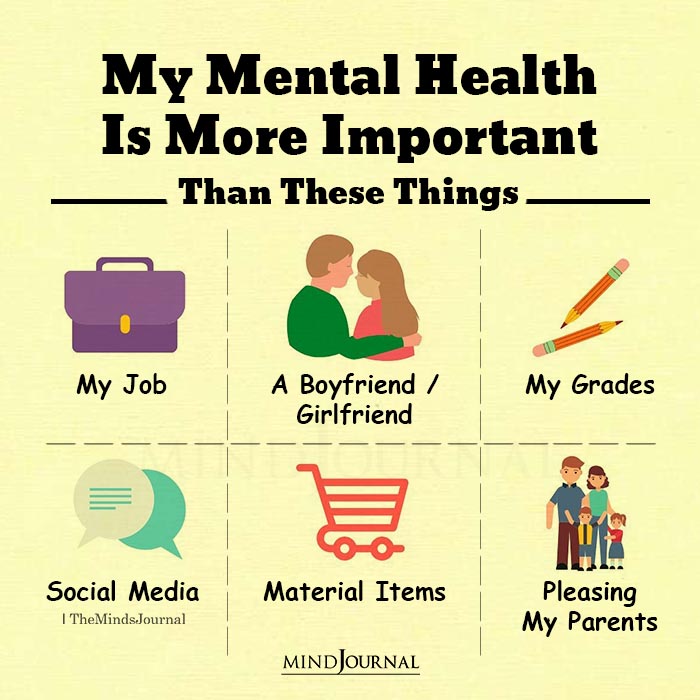
A recent 2018 study has found that 75% of substance use disorder (SUD) cases and 75% of suicide cases involve men. The researchers also observed that mental disorders, categorized as neurodevelopmental disorders, tend to be higher in men. Higher rates of several other psychiatric disorders have also been seen in men, such as –
- Conduct disorder (CD)
- Disruptive and impulse control disorders
- Autism spectrum disorder (ASD)
But does this male our men weak? No. Instead, it reveals that men are stronger than what we think. When it comes to signs of mental health issues in men, researchers have found that there is a certain “unrecognized male depressive syndrome”, which is similar to masked depression.
Related: Why Men Who Cry Are Not Weak, They Are Stronger Than The Rest
While women with depression “act in” when coping with mental illness, men tend to “act out” instead of showing observable signs of male mental health issues. “This ‘acting out’ often involves high levels of alcohol and drug misuse, dangerous risk-taking, poor impulse control, and increased anger and irritability,” explains the researchers.
In fact, studies show that boys and men are at a higher risk of “externalizing” their issues through –
- Aggressive & risk-taking behavior
- Violence toward people & animals
- Destruction of property
- Irritability & hostility
- Escaping behavior
- Lying
- Stealing
- Substance abuse
- Oppositional defiant disorder
- Attention-deficit/hyperactivity disorder (ADHD)
- Antisocial personality disorder
- Poor quality relationships
- Social withdrawal or isolation
Such behaviors, instead of sharing their feelings or crying, are what men have been taught to believe as “dominant notions of masculinity”. These behaviors help men to hide their depression, loneliness, sadness, and isolation which can eventually become morbid. In fact, the researchers saw that men experience higher levels of substance abuse when coping with anxiety or depression than women.
Sadly, “men kill themselves at a much higher proportion than women, despite experiencing significantly lower rates of depression.” No, this is not a competition among men and women. But there is an urgent need for men’s mental health awareness. As the signs of mental health issues in men have a hidden nature, it is seen as a “silent crisis” by experts, which is not being addressed properly.
Related: Men, Not Women, Feel More Emotional Pain After A Breakup: Study Reveals
Stigma worsens male mental health issues
Some researchers are starting to believe that mental illness in men is a “silent killer”, not just a crisis. Because of social stigma. It acts as a strong and powerful barrier to men wanting to seek treatment for mental illness. Traditional masculine norms and culture, not only affect women, but it affects men as well. It defines what men and masculinity should look like, forcing men with mental illness to hide their symptoms. As a result, their friends and family are unable to identify the signs of mental health issues in men and fail to encourage the sufferer to seek medical help.
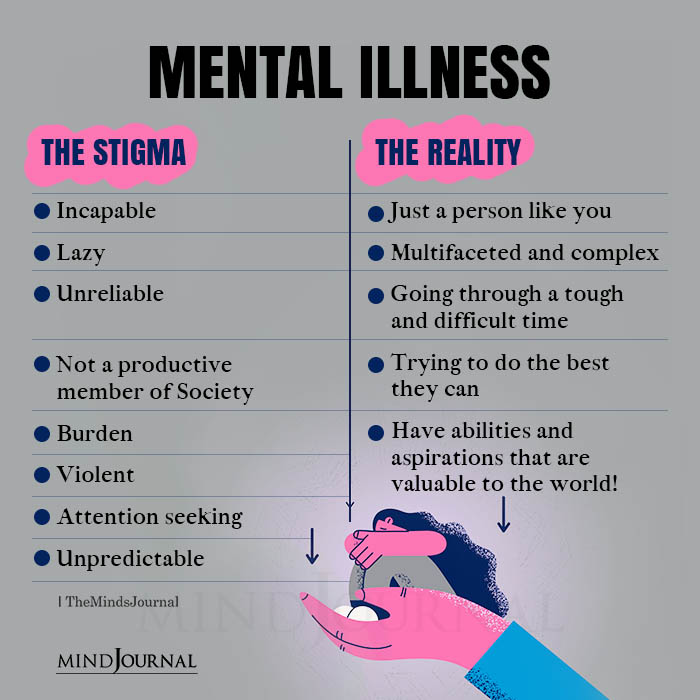
Mental health stigma, whether it is social or professional, leads to “negative attitudes toward and disapproval of a person or group experiencing mental health illness rooted in the misperception that symptoms of mental illness are based on a person having a weak character,” explain the researchers. Such negative attitudes result in –
- Rejection
- Avoidance
- Discrimination against mental illness in men
Self-perceived stigma also affects men coping with psychological issues and prevents them from talking about or seeking help out of shame and guilt. The sad truth is our cultural norms and standards of masculinity are driving men with mental illness to their deaths. Instead of focusing on identifying the signs of mental health issues in men or spreading men’s mental health awareness, we are keeping our men from seeking help.
Related: 18 Powerful Ways We Can Reduce the Mental Health Stigma
Men are supposed to be aggressive and rough, they are not expected to express their emotions or cry. And if you do, you will be immediately branded as a “sissy man”. But if we keep sticking on to these toxic masculinity norms, it will only worsen the signs of mental health issues in men and result in –
- Higher degrees of psychological distress
- Severe anxiety and depression
- Substance abuse
- Relationship issues and problems with intimacy
- Shame
- Loss of hope
- Poor self-esteem
- Disempowerment
- Physical health risk
- Discouragement in seeking medical help
Stigma and discrimination against men’s mental health issues can even increase morbidity and mortality rate in men suffering from psychiatric disorders.
We need to look at masculinity differently
Studies show that “Compared to women, men are less likely to seek help for mental health difficulties.” Men have negative attitudes towards seeking mental health support as it is seen as “unmanly”. Although a man with mental illness may seek help for physical symptoms of mental disorders, they are highly likely to completely avoid the emotional symptoms. It becomes worse as they try to self-medicate using higher amounts of alcohol and substances.
This is why we need to redefine masculinity and manhood. We need to learn to identify the signs of mental health issues in men and encourage those who are suffering to get the help they need and deserve. We need to normalize talking about men’s mental health so that more and more men step forward to share their issues and seek professional help.
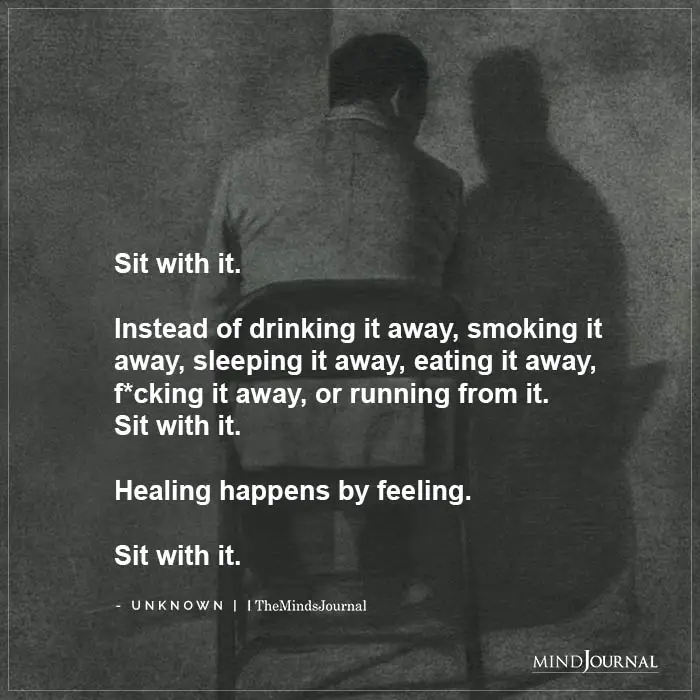
It’s okay to have mental health issues, and it is okay to get help, whether you are a man, woman or any other gender you identify as.
It is time we change as a society. As humans. And as men.
Related: 10 Rules For Modern Masculinity
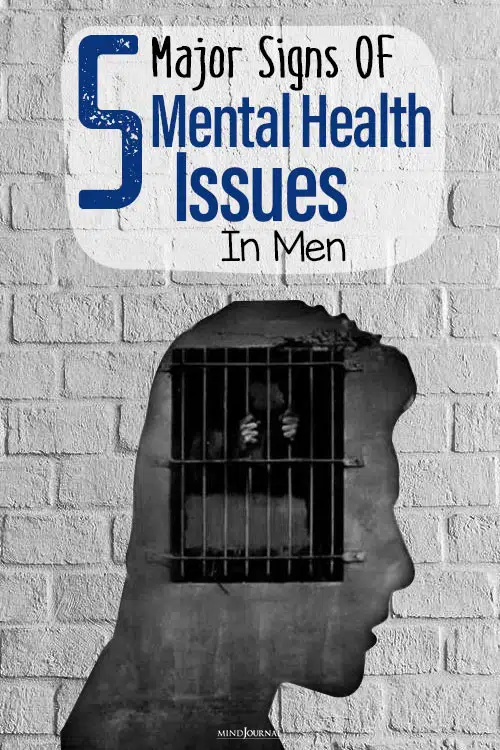
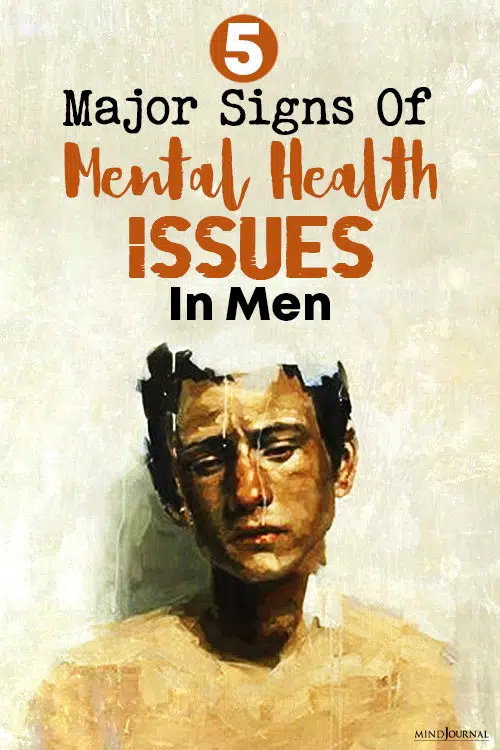
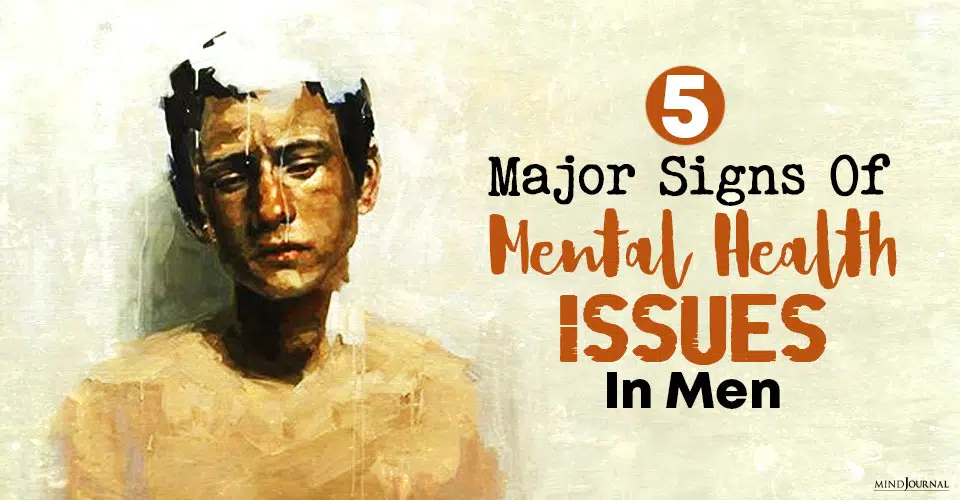







Leave a Reply
You must be logged in to post a comment.